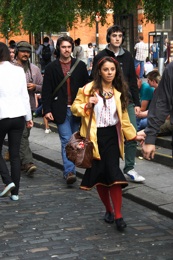Wonderland’s latest offering continues in their tradition of ambitious and imaginative work. Sylvia’s Quest is the site-specific journey of Sylvia Sylvana, a young Bulgarian woman recently arrived in Ireland and working as a cleaner for the Mulhalls.
Sylvia’s doubly redolent name, with its woodland and magical associations, is also linked to the name of her home place, and her memories are imbued with a vivid sense of its history. She had worked as an amateur archaeologist assisting her uncle, and her narrative reminds us of the past glories of this part of the world so little known and understood by Western Europeans. For this was Ancient Thrace, the home of the historical Orpheus who became an inherent part of Greek myth – a place of magnificent golden artefacts, intact labyrinths to rival those of Crete, and of Pagane, an oracle whose mountain-top site remains intact.
But Sylvia lives in the contemporary world of mobile phones, street drugs and racial slurs. The precarious state of the publishing industry is used by her comfortably middle-class employer as an excuse to cheat Sylvia of her wages.
Through the labyrinth of Dublin’s Temple Bar Elitsa Dimova as Sylvia leads audience participants who follow dialogue by means of radio transmission as she speaks with her uncle and “Baba” (or grandmother) at home; an aggressive homeless woman whom she encountered early on in Dublin; a compassionate restaurant owner; and the various members of the Mulhall clan, living and dead. Sylvia also communes with Pagane and favours the colour yellow in every aspect of her life, as it is the choice of the Thracian gods (or so we are led to believe).
 The symbology of the drama is, therefore, complex, and overburdened at times. Writer Alice Coghlan has an impressive history of inventive, site-specific shows, many of them adaptations of classics. She is also experienced in other arts and media including opera, television and children’s theatre. Sylvia’s Quest emerges from her personal experience of Bulgaria and, in an effort to explain the country to Irish audiences, she has engaged in a worthy and intriguing project which includes a programme chock-a-block with historic, mythic, and socio-cultural detail about Bulgaria, supplemented by interviews with several recent emigrants to Ireland. But Sylvia’s Quest ultimately suffers from attempting to do too much, and from an inability to avoid a degree of feyness that can impede the author’s broader dramatic aims.
The symbology of the drama is, therefore, complex, and overburdened at times. Writer Alice Coghlan has an impressive history of inventive, site-specific shows, many of them adaptations of classics. She is also experienced in other arts and media including opera, television and children’s theatre. Sylvia’s Quest emerges from her personal experience of Bulgaria and, in an effort to explain the country to Irish audiences, she has engaged in a worthy and intriguing project which includes a programme chock-a-block with historic, mythic, and socio-cultural detail about Bulgaria, supplemented by interviews with several recent emigrants to Ireland. But Sylvia’s Quest ultimately suffers from attempting to do too much, and from an inability to avoid a degree of feyness that can impede the author’s broader dramatic aims.
Dimova, a diminutive actor, delivers a graceful performance requiring a variety of skills, vocal and physical. She interacts with members of the audience – always a potential minefield for either party – with both charm and confidence. The audio performers sketch hauntingly vivid personalities, especially Anne Marie O’Donovan as Homeless Hazel. Sound designer Tommy Foster meets and surpasses the challenge of providing such subtle audio variation, continuity and clarity which is sustained through fluctuating outdoor conditions. Costuming by Maria Tapper, using bright yellow and red throughout, conveys a folkloric element, while jewellery design by Paula Boyle carries through the spiral motif of the labyrinth, and suggests a Celtic link.
It is worth noting that the logistics of site-specific performance are challenging. That challenge was being met by Wonderland having the author and two others from the production team accompany the audience and actor throughout the entire journey - but the risk to an actor or member of the audience, or the threat of a sabotaged performance on the streets of Dublin, is not negligible.
On the other hand, here’s to the people of Dublin and the visitors to the city, who stopped, smiled, stood aside and showed interest and encouragement when exposed to an unlooked-for event which did, and should, show the city arts scene to advantage.
Christina Mahony